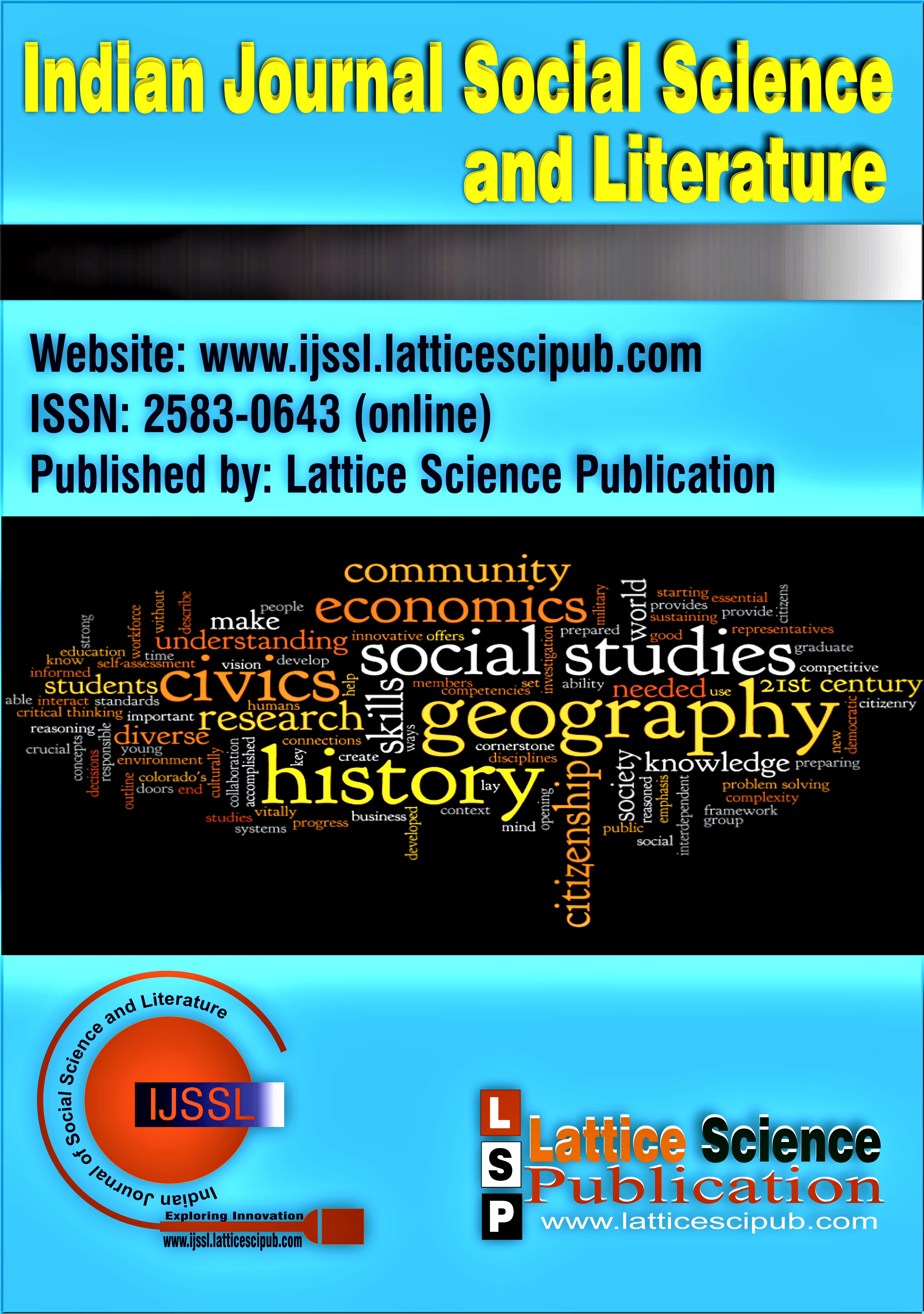Queer Lineages, Colonial Shadows: Trans Autobiography and the Revival of Gender Plurality in India
Main Article Content
Abstract
This paper examines the transformative power of transgender autobiographical narratives in contemporary India, positioning them as crucial interventions in the struggle for recognition, dignity, and systemic change, and centres on the life writings of A. Revathi (The Truth About Me), Living Smile Vidya (I Am Vidya), and Laxmi Narayan Tripathi (Me Hijra, Me Laxmi), the subjects of this study, which explores how these texts function not merely as personal accounts but as political acts that challenge entrenched hierarchies of caste, gender, and sexuality. By drawing on Judith Butler’s theory of gender performativity and Michel Foucault’s concept of biopower, the research analyses how these narratives subvert normative frameworks and re-signify the meaning of gender identity in the Indian context. This research was conducted to interrogate the colonial and postcolonial erasure of non-normative identities and to demonstrate how trans autobiographies serve as counter-narratives to dominant discourses. The colonial imposition of Section 377 and Victorian moral codes pathologized queer existence, embedding heteronormativity into India's legal and cultural institutions. Although legal victories, such as the NALSA judgment (2014) and the decriminalisation of Section 377 (2018), mark significant progress, they remain insufficient without a concurrent cultural reckoning. This study therefore emphasizes the need to read autobiographical acts as modes of resistance that transcend juridical frameworks. Ultimately, these narratives articulate what Gayatri Spivak calls subaltern speech, not from the margins seeking entry but from a space of epistemic authority. They reimagine the boundaries of kinship, nationhood, and citizenship, offering a new cartography of belonging rooted in lived experience and cultural hybridity. In doing so, they resist the forces of erasure and enact a future already being written by queer lives at the intersections of caste, gender, class, and faith. These autobiographies are not just stories of survival; they are blueprints for a radically inclusive and decolonized social imagination.
Downloads
Article Details

This work is licensed under a Creative Commons Attribution-NonCommercial-NoDerivatives 4.0 International License.
How to Cite
References
Revathi, A. The Truth About Me: A Hijra Life Story. Penguin Books India, 2010.
https://www.researchgate.net/publication/306257305_The_Truth_about_Me_A_Hijra_Life_Story
Living Smile Vidya. I Am Vidya: A Transgender’s Journey. Oxygen Books, 2007. https://www.scribd.com/document/730254611/I-Am-Vidya-Living-Smile-Vidya
Tripathi, Laxmi Narayan. Me Hijra, Me Laxmi. Oxford University Press, 2015. https://archive.org/details/laxmi-me-hijra-me-laxmi-oxford-university-press-2015?utm_source=chatgpt.com
Butler, Judith. Gender Trouble: Feminism and the Subversion of Identity. Routledge, 1990.
https://lauragonzalez.com/TC/BUTLER_gender_trouble.pdf
Foucault, Michel. The History of Sexuality: Volume I: An Introduction. Translated by Robert Hurley, Pantheon Books, 1978.
https://monoskop.org/images/4/40/Foucault_Michel_The_History_of_Sexuality_1_An_Introduction.pdf
Baruah, Pallabi. Trans Narratives and Politics of the Body in Autobiographies of Three Indian Transgenders. 2019. Gauhati University, PhD dissertation. Shodhganga,
https://shodhganga.inflibnet.ac.in/handle/10603/295792.
Nanda, Serena. Neither Man Nor Woman: The Hijras of India. Wadsworth, 1999.
https://petervas.wordpress.com/wp-content/uploads/2013/03/serena_nanda.pdf
Vanita, Ruth, and Saleem Kidwai, eds. Same Sex Love in India: Readings from Literature and History. Palgrave Macmillan, 2000. https://link.springer.com/book/10.1057/9781403981055
Narrain, Arvind. Queer: Despised Sexuality, Law and Social Change. Books for Change, 2004. https://vdoc.pub/documents/queer-despised-sexuality-law-and-social-change-3nhvl51mpjk0
Gupta, Alok. “Section 377 and the Dignity of Indian Homosexuals.” Economic and Political Weekly, vol. 41, no. 46, 2006, pp. 4815–4823. https://www.iglhrc.org/sites/default/files/15-1.pdf
National Legal Services Authority v. Union of India, AIR 2014 SC 1863. Supreme Court of India, 15 Apr. 2014. https://main.sci.gov.in/judgments
Navtej Singh Johar v. Union of India, AIR 2018 SC 4321. Supreme Court of India, 6 Sept. 2018, https://main.sci.gov.in/judgments
Banu, Grace. “We Are Not Allowed to Dream: Trans Activist Grace Banu on Caste and Gender Discrimination.” The News Minute, 23 July 2019, www.thenewsminute.com/article/we-are-not-allowed-dream-trans-activist-grace-banu-caste-and-gender-discrimination-105933.
Vicks India. “Touch of Care – Gauri Sawant.” YouTube, uploaded by Vicks India, 2017. https://www.youtube.com/watch?v=adKPYWs_u2c
Subramaniam, Kalki. Sahodari Foundation. sahodari.org. Accessed 23 May 2025. https://sahodari.org/
Rao, R. Raj. The Boyfriend. Penguin Books India, 2003. https://archive.org/details/boyfriend0000rajr
Dhaliwal, Gazal. Ek Ladki Ko Dekha Toh Aisa Laga. Directed by Shelly Chopra Dhar, performances by Sonam Kapoor and Rajkummar Rao, Vinod Chopra Films, 2019. https://www.imdb.com/title/tt8108164/
Chandigarh Kare Aashiqui. Directed by Abhishek Kapoor, performances by Ayushmann Khurrana and Vaani Kapoor, Guy in the Sky Pictures, T-Series, and Netflix, 2021. https://www.imdb.com/title/tt12861850/
Super Deluxe. Directed by Thiagarajan Kumararaja, performances by Vijay Sethupathi et al., Tyler Durden and Kino Fist, 2019. https://www.imdb.com/title/tt7019942/?ref_=fn_all_ttl_1
Aravani Art Project. Aravani Art Project, aravaniartproject.com. Accessed 23 May 2025. https://aravaniartproject.com/
Mondal, Joyita. “India’s First Transgender Judge.” The Hindu, 2017. https://www.thehindu.com/news/national/first-transgender-judge-seeks-reservation-in-government-jobs-for-her-community/article66273696.ece
Sathyasri, Sharmila. “Meet India’s First Transgender Lawyer.” India Today, 2018. https://www.indiatoday.in/india/story/meet-india-s-first-transgender-lawyer-sathyasri-sharmila-1274308-2018-07-01
Chaudhuri, Pooja. “From Anjali Lama to Navya Singh, Meet India’s Transgender Role Models.” The Quint, 16 Nov. 2017.
https://www.thequint.com/news/india/india-transgender-role-models-anjali-lama-navya-singh.
Reddy, Gayatri. Concerning Sex: Negotiating Hijra Identity in South India. University of Chicago Press, 2005.
https://press.uchicago.edu/ucp/books/book/chicago/W/bo3534006.html
Bhabha, Homi K. The Location of Culture. Routledge, 1994. https://ia601402.us.archive.org/11/items/TheLocationOfCultureBHABHA/the%20location%20of%20culture%20BHABHA.pdf
Spivak, Gayatri Chakravorty. “Can the Subaltern Speak?” Marxism and the Interpretation of Culture, edited by Cary Nelson and Lawrence Grossberg, University of Illinois Press, 1988, pp. 271–313.
http://www.etesta.it/materiali/2015_2016_Spivak.pdf
Gopal, Priyamvada. Insurgent Empire: Anticolonial Resistance and British Dissent. Verso, 2019. https://www.versobooks.com/en-gb/products/207-insurgent-empire?srsltid=AfmBOooy4jHHxHRfTiLLpmck6r2mrflMkXqJ_MBFHKjAxANoI7RaxYcJ
Stryker, Susan. Transgender History. Seal Press, 2008. https://transreads.org/wp-content/uploads/2019/03/2019-03-17_5c8eb1ebaced4_susan-stryker-transgender-history2.pdf
Butler, Judith. Undoing Gender. Routledge, 2004. https://selforganizedseminar.wordpress.com/wp-content/uploads/2011/07/butler-undoing_gender.pdf
Munoz, Jose Esteban. Cruising Utopia: The Then and There of Queer Futurity. NYU Press, 2009. https://www.jstor.org/stable/j.ctt9qg4nr





